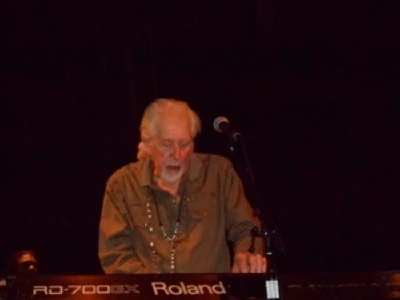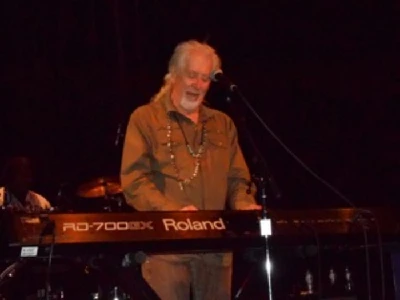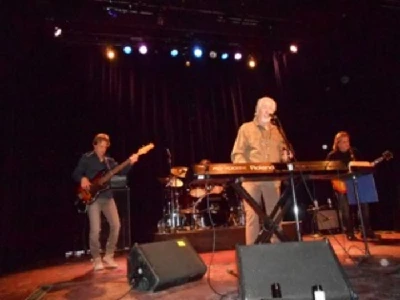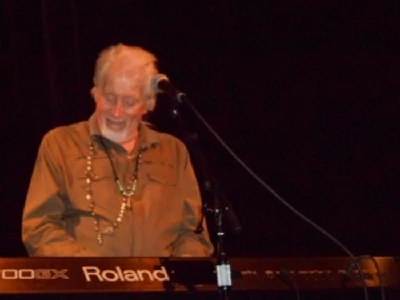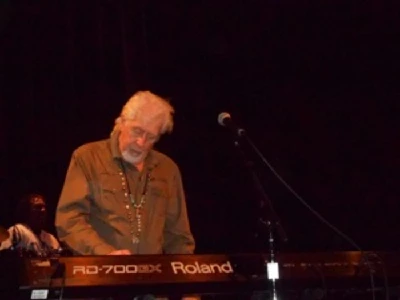John Mayall
-
Mayne Stage, Chicago, 18/9/2012
published: 7 /
10 /
2012
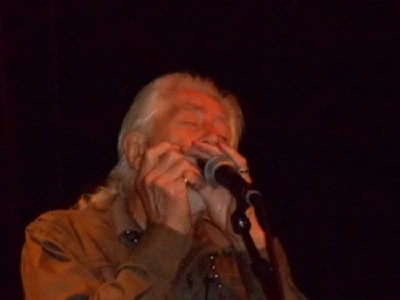
Lisa Torem finds septarian musician John Mayall continuing to push his own musical limits in an explosive set of blues rock at the Mayne Stage in Chicago
Article
A couple of hours before the show a man posed for photos behind the merchandise table. His white hair and blue eyes looked oddly familiar, but no, it couldn’t be…stars don’t come out before the show, do they? Don’t they sip wine in the green room whilst their colleagues sweat out the first few songs?
Well, apparently, not all of them do. And it wouldn’t be the last time tonight that this British trendsetter would forge ahead even when one of the crew could save him some steps. He would be separating patch chords, making sure his RD-700 GXRoland would be properly mic’d and he would be enthusiastically warming up the crowd along with his mates, thank you very much.
John Mayall may well be the legendary bandleader of the Bluesbreakers, which he formed in the 1960s, a swashbuckling blues harpist, multi-instrumentalist and composer, and he may have seeded the careers of the likes of Peter Green, Eric Clapton and Jack Bruce, but he is no diva. In fact, he is one of a few in the business who can simultaneously run a tight ship and still have “room to move.”
By the time the show began, most of the audience was seated and the Mayne Stage was almost filled to capacity. Though most had salt and pepper hair, a few younger people were sprinkled throughout. Many of them had been dedicated fans of his records, but had never seen him live, though one man saw him in the late 1960s; trouble is, he remembered he enjoyed the concert, but he just didn’t remember how he got there.
Solo, Mayall pursed his lips around his blues harp and ripped from the vault, ‘Another Man Done Gone’.
“I didn’t know his name/I didn’t know his name,” he sang, his voice low, lived in and deliberate. He puffed out phrases after each bluesy verse; his white ponytail and jewelled necklace obediently pulsing in tandem; that flamboyant freight train sound filling the darkly lit room.
Wearing a long sleeved work shirt and dungarees, Mayall resembled a man who randomly stepped onstage, but his ambidextrous act belied that possibility. With the left hand he cradled the harp between his long fingers and with the right, he matched the riffs with the keys. He turned towards his band members, two from Chicago and one from Texas, and introduced them with great warmth.
‘I’m A Sucker For Love’ featured the band. Mayall’s harp solo quivered and banged out closing notes of dominant phrases. Monster octaves on the keys triggered responses by Greg Rzab, who I had already pegged as a talented, but reserved bassist, but the night was still young…
‘Blues From Laurel Canyon’ was dedicated to a late member of Canned Heat. Mayall was known to have selected several band members from the group. It was apparent that the song instigated feelings of nostalgia by the way Mayall’s voice softened when he paid his respects, although his technical articulation defied his casual demeanour.
He traded licks with the aforementioned Texan, lead guitarist Rocky Athas, a broad shouldered virtuoso, who was hand picked at a popular night club, to accompany him on tour and for recording projects. Next they played ‘Nothing to Do with Love,’ from ‘Tough’, this line-up’s debut album, which reestablishes their collective blues roots.
“You say you love me, honey…,” Mayall despaired. Jay Davenport’s drums drizzled, then nearly exploded. The band entertained with rock/funk and a smokey exuberance. Mayall doubled the notes with the keys, slyly weaving in the harp. Rzab fiercely expanded the terrain. Across the room, Athas curried cues from Mayall, sounding every bit as steady as Bach’s ‘Well-tempered Clavier’.
‘Congo Square’ is in honour of the people of New Orleans. Beginning with a take no prisoner’s melody on keyboards, and joined by throbbing percussion, the full sound gradually built until the verse swaggered. Sharp, with billowing rhythm, Mayall sang his most melodic solo of the night and Athas matched the intensity in kind.
Another tune from ‘Tough’, ‘Moving Out and Moving On’ found Mayall so completely absorbed that he gazed up, saying, “I seem to have lost the piano – help…” Then in a split second he broke into a grateful smile: “There it is…”
The bass lines crawled stepwise, the cymbal echoed harshly, and Mayall added a compelling counter rhythm; a mound of apple pie after a blue plate special.
On ‘So Many Roads,’ Athas created a weeping solo leaving Mayall to temporarily outline chords, but not for long. His boyish expression acknowledged that he was up to something. Athas soaked up the smiles several audience members lavished on him as he stalked the stage. In awe, Mayall bows. “You see in Texas they know what to do with the blues, as well…”
‘Chicago Line,’ he wrote, he admitted, not knowing “there is no Chicago Line.” Who cares though? It’s every bit as punchy as ‘Take the A Train’ or ‘Rock Island Line,’ as far as that genre goes. The solo featured his famous, locomotive vamp. Rzab slammed the bass, clearly cueing Mayall’s manic mindset. The trio sat back, but the drums stayed on the warpath. Athas enjoyed the spotlight, obviously lost in emotion as Mayall’s spoken rubato escalated. It’s not always jazz cats that scat.
If you have not seen the band perform, I won’t ruin any surprises, but let’s just say that Rzab, who initially came off as a bit reserved, gave to the John Mayall band what Jimmy Page gave to the Yardbirds. You will most likely never see a bass performance quite like the one Rzab delivered and yet, offstage, his modest response to any positive comments was: “I didn’t know what I was doing up there!”
But after being probed, Rzab revealed Mayall’s virile advice: “Always be dangerous. Danger is exciting. Don’t be afraid to be dangerous. He lets me do anything I want to do…”
What followed was Curtis Salgado’s ‘The Song of Something’, a heavily jazz inflected anthem, which broadcasted Mayall’s eclectic bent, but even though the song swung it was the high ball before the entrée.
The night could not be complete without the marvellous ‘Room to Move.’ Bare drums and harp foreshadowed the crazed, combustible rhythms, and soon a palpable mirroring took place between Rzab and Mayall. Because the song allowed every man his moment onstage, we really got to know the band tonight, not only through the mastery of their instruments, but by their appreciation for the music itself and by their honesty.
Mayall, a septarian, whose intense touring schedule could break down a baby boomer, even admits: “People always ask me where we’re playing tomorrow and I don’t know…”
‘Room to Move,’ was such a crowd pleaser that nobody dared to let the band go home. The quartet responded to the foot stomping ovation by playing another Mayall staple, Freddie King’s instrumental ‘Hideaway’. Their version, though markedly different from the one recorded by King in the mid 1960s, still retained a distinct Chicago accent, especially when the sinister ‘Peter Gunn’ theme reached to the rafters.
And without missing a beat, our man was back at the merchandise table, but this time joined by the clan. That John Mayall offers his players, “room to move,” is uncontested, but the buzz that freedom brings comes with a double dare. If there’s one thing to remember tonight it’s Rzab’s immortal words: “Always be dangerous.” Performing the blues has never been about staying in your comfort zone thanks to players like John Mayall.
Band Links:-
https://www.johnmayall.com/
https://www.facebook.com/JohnMayall/
Have a Listen:-
Picture Gallery:-
